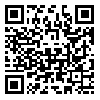Sat, Feb 7, 2026
| فارسی
Volume 27, Issue 4 (Winter 2022)
IJPCP 2022, 27(4): 492-507 |
Back to browse issues page
Download citation:
BibTeX | RIS | EndNote | Medlars | ProCite | Reference Manager | RefWorks
Send citation to:



BibTeX | RIS | EndNote | Medlars | ProCite | Reference Manager | RefWorks
Send citation to:
Ashouri A, Farokhnezhad Afshar P, Alimoradi H, Talebizadeh M. Psychometric properties of the Persian version of Trait Emotional Intelligence Questionnaire in College Students. IJPCP 2022; 27 (4) :492-507
URL: http://ijpcp.iums.ac.ir/article-1-3031-en.html
URL: http://ijpcp.iums.ac.ir/article-1-3031-en.html
1- Department of Clinical Psychology, School of Behavioral Sciences and Mental Health (Tehran Institute of Psychiatry), Iran University of Medical Sciences, Tehran.
2- Department of Gerontology, School of Behavioral Sciences and Mental Health (Tehran Institute of Psychiatry), Iran University of Medical Sciences, Tehran.
3- Department of Education and Psychology, Faculty of Psychology, Shahid Beheshti University, Tehran, Iran.
4- Department of Clinical Psychology, School of Behavioral Sciences and Mental Health (Tehran Institute of Psychiatry), Iran University of Medical Sciences, Tehran. ,talebizadeh.m@tak.iums.ac.ir
2- Department of Gerontology, School of Behavioral Sciences and Mental Health (Tehran Institute of Psychiatry), Iran University of Medical Sciences, Tehran.
3- Department of Education and Psychology, Faculty of Psychology, Shahid Beheshti University, Tehran, Iran.
4- Department of Clinical Psychology, School of Behavioral Sciences and Mental Health (Tehran Institute of Psychiatry), Iran University of Medical Sciences, Tehran. ,
Abstract: (6494 Views)
Objectives: This study aims to translate and evaluate the psychometric properties of the Persian version of Trait Emotional Intelligence Questionnaire (TEIQue) in college students.
Methods: This is a descriptive study. Participants were 551 students from selected universities in Tehran, Iran who were enrolled using a stratified random sampling method. The students completed the Persian version of TEIQue as well as the Schutte Self Report Emotional Intelligence Test (SSEIT) and the Neo-Five Factor Inventory (NEO-FFI). Data were analyzed in SPSS v. 22 software using independent t-test, Cronbach’s alpha, Pearson correlation and Exploratory Factor Analysis (EFA).
Results: The results of EFA confirmed that the Persian TEIQue had four factors of well-being, self-control, emotionality and sociability. Cronbach’s alpha value was reported 0.95 for the global EI, and ranged 0.69-0.90 for its four factors. In the split-half reliability, the Cronbach’s alpha was obtained 0.92 for the first half and 0.89 for the second half. The convergent/discriminant validity assessment in relation to SSEIT and NEO-FFI, showed a positive correlation with the most subscales of SSEIT and a negative correlation with the neuroticism subscale of NEO-FFI. There were gender differences in TEIQue scores between males and females, where females had higher scores in the global index and in factors of well-being and emotionality.
Conclusion: The Persian version of TEIQue has acceptable reliability and validity for measuring trait emotional intelligence in Iranian adult population.
Methods: This is a descriptive study. Participants were 551 students from selected universities in Tehran, Iran who were enrolled using a stratified random sampling method. The students completed the Persian version of TEIQue as well as the Schutte Self Report Emotional Intelligence Test (SSEIT) and the Neo-Five Factor Inventory (NEO-FFI). Data were analyzed in SPSS v. 22 software using independent t-test, Cronbach’s alpha, Pearson correlation and Exploratory Factor Analysis (EFA).
Results: The results of EFA confirmed that the Persian TEIQue had four factors of well-being, self-control, emotionality and sociability. Cronbach’s alpha value was reported 0.95 for the global EI, and ranged 0.69-0.90 for its four factors. In the split-half reliability, the Cronbach’s alpha was obtained 0.92 for the first half and 0.89 for the second half. The convergent/discriminant validity assessment in relation to SSEIT and NEO-FFI, showed a positive correlation with the most subscales of SSEIT and a negative correlation with the neuroticism subscale of NEO-FFI. There were gender differences in TEIQue scores between males and females, where females had higher scores in the global index and in factors of well-being and emotionality.
Conclusion: The Persian version of TEIQue has acceptable reliability and validity for measuring trait emotional intelligence in Iranian adult population.
Type of Study: Original Research |
Subject:
Psychiatry and Psychology
Received: 2019/06/15 | Accepted: 2020/12/27 | Published: 2022/01/1
Received: 2019/06/15 | Accepted: 2020/12/27 | Published: 2022/01/1
| Rights and permissions | |
 |
This work is licensed under a Creative Commons Attribution-NonCommercial 4.0 International License. |






